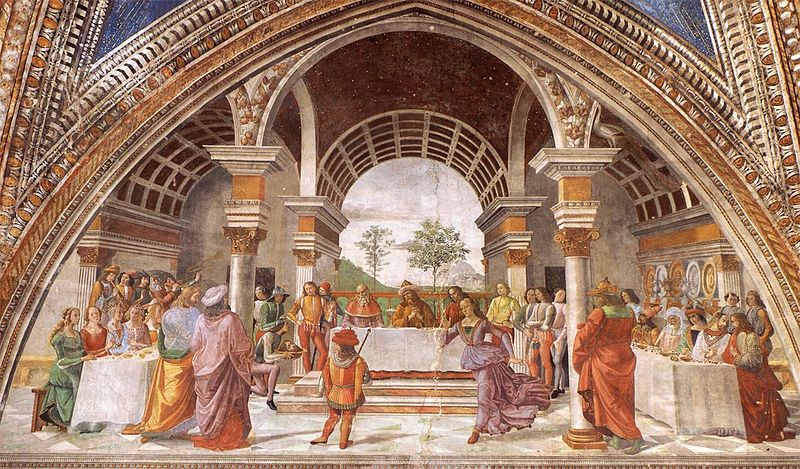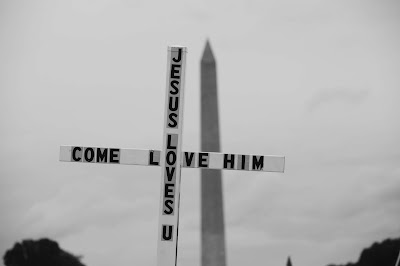Mark 6:30-56
 |
| James Tissot, Jesus Teaches the People by the Sea 1886-1894 (PD) |
THAT was out of this world!
This is one of the compliments I seek to not only give but to receive when it comes to food.
I enjoy food, it even sneaks into my sermons time and again, as many of you know.
This past week, I did a lot of the cooking for the Junior High Servant Event.
With the help of one of our members, ________, we fed nearly forty hungry mouths with a low country boil and some smoked barbecue, to name a few of the meals that were served.
Some of the youth had never eaten a low country boil before, so I was on the edge of my seat waiting to see their responses as they piled heaps of shrimp, kielbasa, potatoes, and corn on their plates.
We did get a few “that was out of this world” comments.
Oddly, the most satisfying praise received was when ____ and I sat across from one another, filled up our own plates, threw our utensils and our cares to the wind, then dug in with our own bare hands.
With shrimp shells flying through the air and eyes locked squarely on our plates, we traded compliments on one another’s cooking with comments that were muffled by mouthfuls of low country boil.
Comments like;
“Oh, yeah”
“Hmmm, yeah, this is good”
“Hoooeeey! Wow!”
and my favorite;
“Oh baby!”
My favorite part about the meal was that I was able to not only receive “out of this world” comments on the food but to simultaneously give such compliments to my culinary compadre!
I think we both enjoyed it, in spite of the disgusted and at times concerned looks on the faces of others around us.
 |
| Photo by Priscilla Du Preez on Unsplash |
Last week, Pastor Stephen discussed the banquet hosted by Herod.
A banquet where not only a fine meal was served, but the head of John the Baptizer.
A banquet where Herod covets the praise of his guests, just as much as I did last week.
For Herod, the party he hosts is intended to usher in the favor of others both personally and politically.
John is not necessarily a political adversary, but the nature of his preaching and teaching poses a political problem for Herod.
Herod aspires to be Israel’s Jewish King, whose power is fortified by the Romans.
He wants to be beloved as a modern Davidic King in the Jewish community, while receiving the support of the Emperor and Empire in exchange for his own loyalty.
He is trying to play both sides, he wants to curry favor within his own community while simultaneously holding the favor of the political elites.
John’s preaching and teaching endangers Herod’s image within the Jewish community,
John’s ministry not only endangers his legacy as a king, but it potentially stokes the flames of rebellion that Herod fears could turn Rome against him as a penalty for not maintaining control of the people.
So, last week when we hear of Herod’s banquet, remember he needed to throw a party that was certainly “out of this world.”
Not only a banquet with the best foods and wines, but a banquet that shows his power over those who stand against him.
And regardless of whether he did or did not want to kill John, he is left with only two choices;
look strong or look weak.
At least those are the two choices he has if he is considering the options that are OF this world.
Just as Pastor Stephen said last week, the story of John is meant to be read with the WHOLE story from this week.
We were short changed by the lectionary today, with 19 verses cut out of the the very center of the gospel.
Leaving out Jesus’ feeding of the crowd he meets at his own banquet, followed by him walking out onto the stormy sea to comfort his disciples
The story of Herod’s banquet is meant to be contrasted with the banquet Jesus hosts.
One banquet with a guest list that is specifically crafted to illustrate the who’s who of Israel,
Another with a guest list of the who’s not of Israel.
One banquet with the finest ambiance and entertainment imaginable
Another with a sermon so long, it makes ours look short, and hillside seating.
One banquet with the finest cuisine
And another with five measly loaves of bread and two fish.
One banquet with the best that THIS world has to offer.
Another that is OUT of THIS world.
 |
| Domenico Ghirlandaio, Herod's Banquet 1486-1490 (PD) |
Three pilgrims once traveled high into the Himalayan mountains seeking to overcome their fears which had troubled them and diminished their quality of life.
They were seeking to overcome their fears through the wisdom of a wise hermit who lived in a monastery high in those mountains.
After a long journey they came to a monastery and they were welcomed in.
The hermit asked the first pilgrim, “What is it that your fear?”
The pilgrim replied, “I’m afraid of death”
The wise old hermit told the pilgrim “Death comes to us all, but it will not come for you until you are ready for it’s embrace, know this and be at peace.”
The first pilgrim felt a great sense of peace pass over him after he thanked the hermit and began his journey back down the mountain.
The hermit asked the second pilgrim what he feared.
The second pilgrim replied, “Well I fear my neighbors. They play strange music and have too many children. They also worship different than me and on different days.”
The wise hermit advised, “Oh, strangers! Do not fear my friend, bake them a cake, take toys to their children, and talk to them about their foreign ways. You will fear them no more.”
The second pilgrim felt a great sense of peace pass over after he also thanked the wise hermit and began his journey down the mountain.
Then the hermit asked the third pilgrim what he feared.
The third pilgrim confessed, scanning the walls around him with his eyes,
“I’m afraid of spiders. I dream about them in my sleep crawling all over my walls and on my skin and I can never get any sleep!”
“Oh, Spiders” replied the wise hermit.
“Yeah, they freak me out too. Thats why I live up here. Good luck with that!”
 |
| Photo by Martin Jernberg on Unsplash |
One of the clearest and most overlooked differences in these two stories, these two banquets, is not just the food, the entertainment, and the guest list.
The clearest difference is in the way these two leaders display their power.
Herod’s power is most definitely OF this world.
Herod shows his power by overcoming his enemies through imprisonment, punishment, and death.
Herod uses the threat of worldly power to intimidate his opponents, overcoming them with the swift blow of the executioner’s sword.
All of his guests recognize this type of power, they respect it, and they even use it themselves;
When Herodias and her daughter force Herod’s hand in killing John.
All those gathered together at Herod’s banquet know the power of fear, because fear is a weapon of this world.
Herod’s of this world power is displayed by overcoming his enemies through fear.
But at another banquet, another display of power is taking place.
A power that is truly out of this world.
A power that is out of this world because it is a power that is based neither on fear or personal gain.
It isn’t the power to defeat Jesus’ enemies, it is the power to defeat our own.
It is the power to defeat OUR fears.
Defeating the fear of scarcity by feeding the multitudes from an empty cupboard,
Defeating the fear of our earthly struggles by walking upon the stormy waters of those struggles and riding those waves besides us.
Defeating the fear of death by laying his own hands upon it, those very same hands that will be pierced by those he once healed.
THAT is a power that is OUT of this world and it is a power that no Herod, no worldly leader, no man BUT the Christ can offer this world.
Now, today is a special day.
Today we welcome ________, our sister in Christ to get a bath.
Now, ______, you can ask my wife but I hate bath time!
Because in my house it usually involves whining and crying.
I’m sure many of you can relate.
BUT, THAT is a bath that is OF this world.
Today, you will receive a different kind of bath.
The precious gift of God’s grace, wrapped in the waters of baptism given freely by God for NO other reason but out of love for each and every one of us.
A bath that is OUT of this world.
A bath that will welcome you into God’s Church, just as each and every one of us have been invited into this faith journey through that bath.
A bond that no one can take away, with a power to overcome the fear of anything OF this world.
With the seal of the cross that will be marked on your forehead, assuring you that Christ will walk with you in times of scarcity, times of struggle, and in the face of every fear you will face from this day on.
It is a bath that is truly OUT of this world.
Amen
 |








